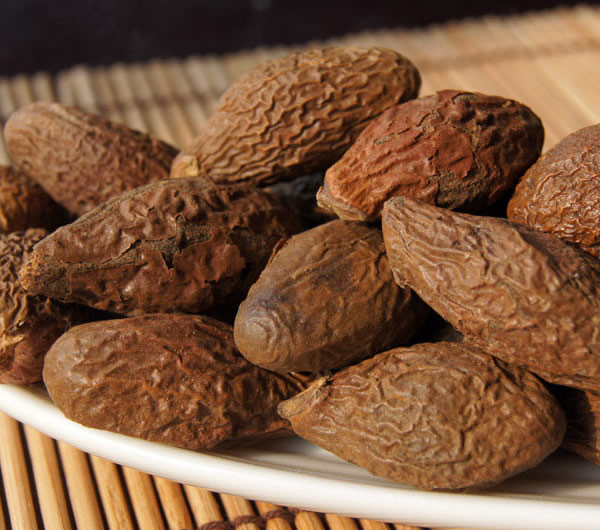As for what to eat with a sore throat, for most of Chinese the answer will probably be malva nut, which is a commonly used Chinese herb also known as Pang Da Hai in mandarin-speaking world. Thanks to its awesome healing and preventive properties, many people consider it as an ideal tea for sore throat since they are accustomed to boiling and drinking it once they feel there's something wrong with their throats. Besides, it works to bleeding gums, voice loss, cough, and other ailments too. But the uses of it vary by time, person, situation, and place. For instance, some of them use it simply because of throat discomfort that is caused by dry environment especially in winter; professionals, including teachers, singers, and announcer, love it as they have to use the voice too much; some smokers drink it for the reason of suffering from Chronic Pharyngitis.
Malva, as a matter of fact, refers to a genus in the family called Malvaceae. Based on the statistics there are around 25 to 30 species of plants in this genus, which share the name mallow with a number of other members in the family Malvaceae. However, medicinally malva nut refers to the mature seeds from Sterculia lychnophora Hance or Sterculia scaphigera Wall, which is a member in the family Sterculiaceae. Hence, other names of this herb include Boat Sterculia Seed, Boat-fruited Scaphium Seed, sterculia Scaphigera Seed, semen scaphii lychnophori, sterculia seed, Semen Sterculiae Scaphigerae, Malva nut tree seed, Taiwan sweet gum tree seed, and more. As you can see now, malva and sterculia are different genera. So, don’t confuse this medicinal plant with Malva alcea, Malva verticillata, and other Malva plants even though its nuts are named after malva.

Malva Nut
NUT OF MALVA BENEFITS
Medicinally it is first recorded in Ben Cao Gang Mu Shi Yi (Supplements to Compendium of Materia Medica). It is named Pang Da Hai, literally "fat sea", because its cracked rind will expand and almost fill the entire cup once it is placed in boiling water. So, plenty of water is required when this nut is cooked or soaked.
From the perspective of traditional Chinese medicine, it has two major healing properties. On the one hand, it can relax the bowels, especially constipation caused by internal fire; on the other hand, it cools and disperses lung qi. Because of that, firstly it can be used for the treatment of acute pharyngitis and tonsillitis induced by wind-heat attacking the lung. In this case, 3 to 5 nuts soaking and making tea is highly recommended. Secondarily, it relieves sore throat after flu shot or wind-heat cold induced fever, scratchy sore throat, dry cough without phlegm, voice loss, and mild or extremely swollen sore throat, and so on. In this case, making tea with 5 nuts and 3 grams Gan Cao (licorice root) is a good try. Besides of making tea, it can be still made into refreshing summer desserts and iced drinks for sore throat, chronic pharyngitis, phlegm, voice loss, etc. By the way, keep in mind to stop it no matter it works or not after it has been drunk for 2 straight days.
SAMPLE RECIPES OF MALVA NUTS ON HERBAL REMEDIES
Chinese Pharmacopoeia says that it is sweet in flavor and cold in nature and it goes to meridians of lung and large intestine. Key functions are to clear heat and moisten lung, relieve sore throat and internal heat, and relax bowel. Essential malva herb uses and indications include lung-heat induced husky voice, dry cough accompanied with no phlegm, dry sore throat, Constipation caused by heat accumulation, Headache, and red eyes. Recommended dosage is from 2 to 3 pieces in soaking in boiling water for tea or decoction.
1. Stewing 5 nuts and 5 grams licorice for tea can be a cure for voice loss, dry cough, dry sore throat, and painful swollen gums that is caused by exogenous pathogenic factors.

![Diseases, Symptoms, tcm, [tcmwindow.com]](/uploadFile/adImg/2015/11/11/f5cbfcc0-4df5-4646-9b9a-f316651a0199.jpg)





